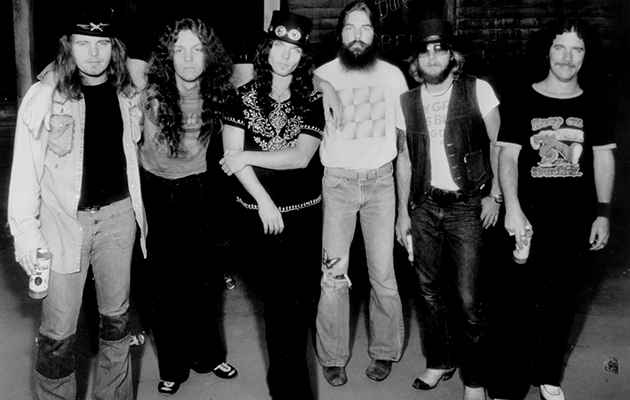“It was the material and their appearance that got me,” recalls Kooper to Uncut. “Ronnie did all kinds of mic-stand tricks and performed barefoot. The songs got me, especially ‘I Ain’t The One’.” The ex-Blood, Sweat & Tears man soon offered them a deal: “I saw the average musical kid hearing ‘Free Bird’ for the first time, lowering his head, and then breaking into a run and smashing it into the nearest wall.”
With Kooper at the helm, Skynyrd cut debut album Pronounced Leh-nerd Skin-nerd for MCA in 1973. All spring-tight riffage, jukin’ country and delinquent boogie, this was chicken-skin music in the raw. On “Simple Man” and “Things Goin’ On”, Van Zant emerged as a lyricist with a common touch, making monuments of everyman while decrying the political hypocrisy that kept them poor. Its calling card, though, was “Free Bird” – a nine-minute odyssey built around Collins’ breathless guitar lines, which sent it spiralling into an ecstatic climax. Anxious to spread the word, Kooper instigated a US tour, supporting The Who.
“We just went out with guns ablaze,” explains keyboardist Billy Powell, talking exclusively to Uncut. “We wanted to blow the doors off. In some places, Skynyrd went down better than The Who. We were drinking and acting crazy, tearing up dressing rooms…”
Adds Rossington: “We were just a band that played clubs, teen dens and pubs. Then, all of a sudden, we were playing in stadiums for 30,000 people. And that’s what drove us to drink. We’d have shots of whiskey every night ’cause we were so scared. I remember it being my birthday, too. I was 22 and Pete Townshend came in with booze and mashed a cake in my face. It was a rowdy start.”
Then came the breakthrough. Released in July ’74, “Sweet Home Alabama” tore into the US Top 10, trailing a storm. Seen as a snipe at Neil Young’s “Southern Man” and “Alabama”, both of which alluded to backwoods racism, it’s been the subject of much debate since (“Sweet Home Alabama” contains the lyric: “Well, I hope Neil Young will remember/A ‘southern man’ don’t need him around anyhow”). Far from some redneck political manifesto, though, the song is actually Van Zant’s impassioned defence of the South, tongue lodged firmly in cheek. Nor was it a declaration of war on Young.
“That whole thing was completely fabricated,” Rossington assures us. “We all loved Neil. Ronnie used to wear Neil Young T-shirts all the time because he loved him and was really inspired by him. He just wrote those lines about ‘Southern Man’, which seemed cute at the time, almost like a play on words. But we didn’t know that song would turn into such a huge deal.”
Skynyrd were on fire. Second Helping, again produced by Kooper, sold well. The likes of “Workin’ For MCA”, “Swamp Music” and “The Ballad Of Curtis Loew” were instant classics. “Ronnie Van Zant was an out-and-out genius,” states third guitarist Ed King. “His lyrics spoke to the man on the street.”
Rossington agrees: “Ronnie could be very profound. He was all about the working-class man. He had a great way with a simple story.”


